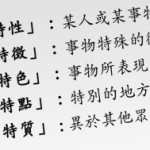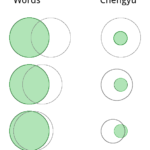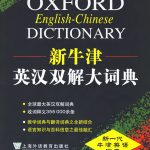Articles in the ‘Vocabulary’ category Page 13
-
Why manually adding and editing flashcards is good for you
Creating your own flashcard is not a waste of time, even if you can find the deck you want on the internet. I have created a fair number of public decks and wouldn’t have downloaded those decks even if they would have been available at the time. Creating your own flashcards gives you control over your deck and facilitates learning in many other ways.
Read → -
The get-back-up-to-speed summer challenge
This is a challenge to encourage readers (and myself) to get more out of the remaining weeks of the summer. I have huge Anki and skritter queues and I plan to fight the down to zero before September 1st. You might need to study more vocabulary or you might have other things you want to complete this summer. Will you join the challenge?
Read → -
Dealing with near-synonyms in Chinese as an independent learner
Near-synonyms cause major headaches for language learners and it’s especially hard for Chinese learners due to the lack of adequate resources in English. This article suggests some ways of handling the problem of near-synonyms when learning Chinese.
Read → -
If you think spaced repetition software is a panacea you are wrong
Spaced repetition software (SRS) is widely discussed online, and generally speaking, there is a spectrum between people who think SRS is the holy grail of learning anything and those that think SRS is artificial, passive and just a waste of time. This article argues that this polarisation is a serious mistake, SRS is a tool and like any other tool, how we use it determines what we get from it.
Read → -
Chengyu, a magic key to Chinese language and culture, or a waste of time?
Many people regard chengyu as the golden key to the Chinese language and believe that learning chengyu will impress native speakers and take their Chinese to the next level. However, learning chengyu in the wrong way is likely to have the opposite effect (“oh, the foreigner is trying to use chengyu, how cute!”). Focus should be on chengyu that are truly useful and frequently used, the rest should be left for those who really like chengyu or for truly advanced students.
Read → -
Is your flashcard deck too big for your own good?
If you use spaced repetition software like Anki for learning Chinese and do so for a few years, you will end up with a very large flashcard deck. Some people advocate deleting the deck if it becomes too big. This article looks closer at the pros and cons of keeping large decks and why you might want to consider starting over from scratch.
Read → -
21 essential dictionaries and corpora for learning Chinese
There are many online resources for looking up Chinese characters and words, so many that it might be very hard for new learners to find what they need. This article introduces 21 dictionaries and corpora for Chinese learners, including what they should be used for in addition to some pros and cons.
Read → -
Horizontal vocabulary learning in Chinese
The normal thing to do when we learning characters or words is to focus on deepening our knowledge, researching components and understanding more about what we’re trying to learn. Some problems can’t be alleviated this way, however, instead they call for horizontal vocabulary learning, i.e. to putting the character or word into context and to compare it with similar characters or words. Only then can we grasp the bigger picture.
Read → -
Improving your Chinese by translating from another language
I think translation is one of the best ways of improving writing ability. Translation forces you into linguistic environments you wouldn’t have ended up in if you wrote the article yourself. This article is about how translation can be used to improve your written Chinese.
Read → -
Don’t use mnemonics for everything
Mnemonics are really cool, but you shouldn’t overuse them. Chinese characters are very complex and the amount of information you might want to remember about them is large. Creating mnemonics for everything is very time consuming and difficult. Instead of doing this, create mnemonics only for things you actually find hard to remember.
Read →







